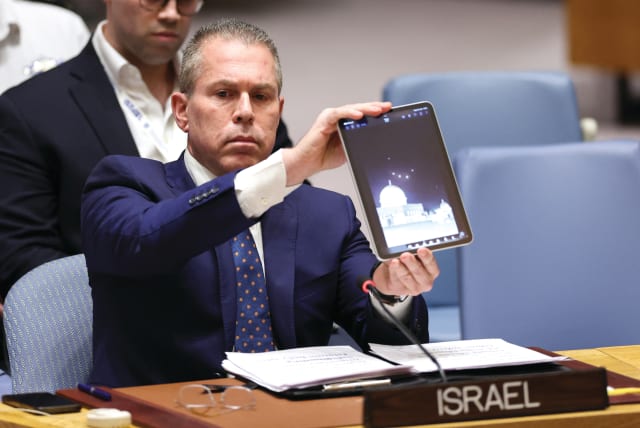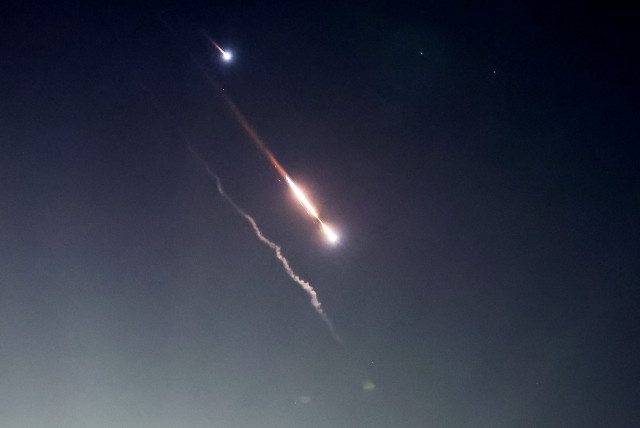Passover 2024: Finding God's presence as the Jewish state fights to survive

Jewish history is cyclical: What happened before will happen again. But it also changes and advances.
As Passover approaches, our minds and hearts are flooded with a range of conflicting emotions.
Oct. 7 was the darkest day in modern Jewish history. Our people were savagely attacked in their homeland. We incorrectly assumed that rape, murder, and torture of innocent and defenseless Jews were scenes from our painful exile and could not occur in Israel.
That day left us with so many questions, chief among them: How could God allow this to happen?
For the past six months, as we have battled to defend our land and our people, God’s presence hasn’t always been evident. In a world of pure evil, rabid hatred, and fabricated truths, it was sometimes difficult to detect the presence of God. We have lived through an agonizing period of hester panim in which the face of God is concealed.
The Passover Haggadah phrase which best typifies this period is the lament that “in every generation, they rise up against us to annihilate us.” So many who we thought were enlightened and who we thought possessed moral conscience have risen up against us in fanatical hatred. The world has felt very dark and very broken.

A week ago, on Saturday night, this reality partially shifted. On one remarkable evening, God’s presence became more apparent. We were savagely attacked by an Iranian missile blitz aimed to inflict enormous casualties upon our innocent civilians.
Astonishingly, almost none of these death warheads penetrated Israeli airspace, and no lives were lost. God enabled our military scientists and engineers to develop a barrier system to protect us from lethal weapons which, literally, fall from the sky.
The Talmud states that on the first Saturday night after creation, God gifted Adam with fire, signaling His desire that man’s divinely endowed creativity be employed to perfect God’s deliberately imperfect world. This past Saturday night, we deployed God’s gift of creativity to preserve human life. In the wake of this extraordinary evening, God’s hand has become more easily visible.
When remedies come first
We also felt His love and caring. The Talmud similarly comments that during dark periods, God’s presence is manifested when a cure appears prior to an illness.
A few years ago, the world suffered an unforeseen pandemic which disrupted every aspect of our reality. The outbreak of the coronavirus launched a frenzied worldwide campaign to develop a vaccine. Though a vaccine solution was ultimately developed, it arrived too late to save those who had already succumbed to the disease. In that instance, the world didn’t receive the cure before the illness struck.
Saturday night was different. We had been developing anti-missile defense systems for years. Yet, despite its importance, this project went relatively unappreciated, save for those directly involved. Until this past Saturday night. Facing a massive and unprecedented attack from a range of different missiles, we discovered that, in our case, the remedy was delivered prior to the threat. Through human agents, God delivered a solution even before the peril surfaced.
A war in heaven
The evening wasn’t just miraculous, it was also historically resonant. As I sat in my safe area waiting for the danger to pass, I recalled the Jews of Egypt on the night of the exodus, trapped in their own homes, waiting for the danger overhead to pass. Just as they awoke the next morning to safety, Israelis awoke feeling sheltered and protected. Death had literally passed over us. It was a night of protection, similar to an earlier original night of protection, at the dawn of Jewish history.
Though the similarities of this miracle to the plague of the firstborn [sons] were obvious, I was more intrigued by the similarities to the plague of barad. This loud and fiery hailstorm was initiated by Moses lifting his hands to the heavens. All the previous plagues had occurred at ground level. The Nile was converted to blood, reptiles swarmed over the country, Egypt teemed with vermin, and dead animal carcasses dotted the land. The initial series of plagues unfolded beneath the feet of the Egyptians.
Barad [hailstones], however, redirected Egyptian eyes heavenward. Once their eyes were lifted to heaven, they never returned to Earth, as the ensuing plagues of locusts and darkness, and the massacre of the firstborn were all centered in heaven.
Directing their attention skyward taught the Egyptians about a God who inhabits the heavens. God lies beyond human imagination and cannot be captured by human thought or terminology. This hierarchy between man and God is exemplified by the distance and altitude between them. While humans inhabit the Earth, God resides in heaven. The loud and crackling thunder of barad, coupled with the fiery hailstorm itself, stressed the awesome might of a God who exists beyond human imagination. Shifting the Egyptians’ attention toward heaven visually underscored the difference between man and God.
This past Saturday night was an extremely loud battle waged entirely in heaven. Unlike the ground invasion of Oct. 7, the entire war was waged above. Ballistic missiles leave our atmosphere and reach the edge of space. Wars in heaven have a divine feel to them. It was deeply symbolic that, with God’s assistance, we defeated our enemies on His turf and in His realm. God delivered us the technology to triumph in His realm.
We are not alone
Additionally, it was significant that the defense of our land was achieved through international cooperation. For the past 75 years we have stood alone, facing a consortium of hostile enemies as we defended our rights to our ancient homeland. This past Saturday night, a coalition of our allies helped defend Israel.
Jewish history is cyclical: What happened before will happen again. But it also changes and advances. Just as we recall and celebrate the past, we must also appreciate when history evolves.
This Passover, we juggle mixed and even contradictory feelings. The long road of Jewish history reminds us that sometimes we see God’s presence, and sometimes we don’t. Faith should steady us, enabling us to both weather difficult periods and to celebrate our success. God is always present, supervising human affairs. Sometimes we understand His ways, and sometimes we don’t. Faith should help smooth out the differences between periods of clarity and periods of confusion.
We must also thank God for the minor miracles, even if our larger victory isn’t complete. Despite the joy and triumph of this past Saturday night, we are still entangled in a very delicate and fragile predicament. The Iranian threat is far from neutralized, and we still face a complex situation in Gaza. Our hostages are still suffering, and families across Israel face a heartbreaking first Passover without their loved ones. It is naïve and insensitive to celebrate the past week’s miracle while ignoring the continuing danger and the larger tragedy.
Yet we thank God for mini-victories, even if we can’t yet see the fuller picture. Dayenu: Step by step. We appreciate all we have been given, while we yearn for much that is missing. Even if we don’t achieve everything, we thank God for what we have achieved. Dayenu.
Life isn’t binary and doesn’t easily break down into moments of darkness and moments of light. Darkness and light overlap. Joy and sadness go hand in hand. This Passover, celebrate Jewish triumphs of the past and the present without whitewashing suffering or simplifying struggle.
In every generation, they rise up against us – yet we thank You. Dayenu.
The writer is a rabbi at Yeshivat Har Etzion/Gush, a hesder pre-military yeshiva. He has smicha (rabbinical ordination) and a BA in computer science from Yeshiva University and a master’s degree in English literature from the City University of New York. He is the author of the upcoming Dark Clouds Above, Faith Below (Kodesh Press, April 2024), which provides religious responses to the massacres of Oct. 7 and the ensuing war.
